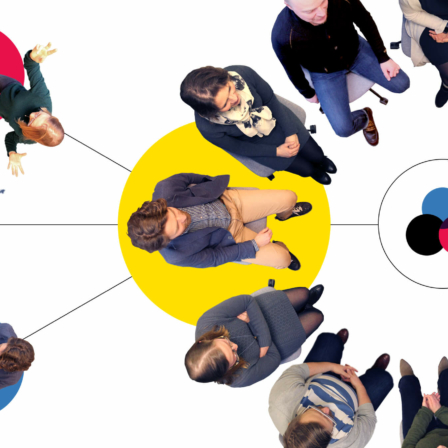I wrote in the Timeout-blog about how to create a good atmosphere for an equal encounter by offering people a chance to talk about their own experiences (read the text).
Dialogue coach, supervisor and researcher Kai Alhanen’s example below talks about experience speech using an imaginary example.
Get acquainted with the example and check out the tool for leading a discussion “Encouraging the participants to tell about their own experiences“
Example: Experience speech on the improvement of employment opportunities for young people
Local youth centre, Wednesday evening at 7 pm. The purpose is to discuss the improvement of local employment opportunities for young people. The local chief executive, a youth worker, a project worker from the 4H association, a single father of two teenage boys and two 17-year-old girls are present. The discussion is led by a headmaster of a nearby comprehensive school, who has been acquainted with Timeout. More participants were expected, and the chief executive seems obviously disappointed at the group’s small size. The Timeout-leader knows that even a small group of people can have a fruitful discussion on important local matters. You just have to engage the participants in authentic dialogue with each other.
When preparing for the discussion, the Timeout-leader tries to avoid the following outcome:
Chief executive: There really is such a small number of people here. Oh well, I will start off by showing you a few slides of how our local strategy has taken into consideration young people’s employment opportunities.
Representative of the 4H organisation: Very good! I could introduce our new project, which is directed at strengthening young people’s preparedness for employment. It is based on completely new coaching methods. Young people are taught how to make audio-visual CVs and how to pitch and search for employment in the social media.
Local youth worker: I think we should also ask what ideas you, young people, have in terms of employment. Please tell us now!
Tiina 17 years: I don’t know, I haven’t really thought about it.
Suleima 17 years: None of my pals have even found summer jobs here. I should maybe move elsewhere.
Father of two boys: I thought you were going to tell us how my two boys can find work. Neither of them got a study place after school. Who’s going to make sure they’re not going to turn socially marginalized like the ones written about it the papers?
Instead of a discussion as above, the Timeout-facilitator encourages the participants to have a dialogue starting from their own experiences. He or she believes that sharing experiences helps the participants better understand the topic in question, each other and also themselves. And so, the leader may do the following:
Timeout- facilitator: It’s nice to see you all here! This is a decent-sized group for thinking about how young people can find employment here in our town. I will first tell you a little bit about the dialogue rules, and then we can present ourselves and start the conversation.
(…)
Let’s get started now that we know the rules and have met the other participants. I could actually tell you a little bit about my own thoughts and impressions on local employment for young people here. Every spring, quite a few young people leave our school, whose future worries me. As a headmaster, I actually feel distressed about the fact that we cannot offer concrete advice and support to the young people that are left without a place to study. Up until a few years ago, the local paper used to have postings about summer jobs. Now there haven’t been any for a long time. I’ve chatted about this with you, Janne, as well as other youth workers, and so far we haven’t found any solutions. That’s why it feels so good to be thinking about this with this group of people. How do the rest of you feel about young people’s employment situation? How does that relate to your own life?
Father of two boys: For me this is part of daily life, every day. Neither of my boys got a study place, and there’s no work available. Now they just spend time at home, playing games.
Timeout-facilitator: Tell us a bit more about how this affects your life.
Father of two boys: I’m really uptight about this to my boys at home, as I fear they’ll never find work, and it angers me that the town does nothing about this.
Timeout-facilitator: It’s good that you mentioned this. Today we have an opportunity to think about this in more detail together. What kind of thoughts, observations or feelings do the rest of you have?
Suleima: I’ve been wondering why so many youngsters are so apathetic here. There’s nowhere to ask about things and get help. I’m doing ok, as I’ve got a study place. I just hope that everyone would have something worthwhile to do.
Local youth worker: I feel a bit like a failure listening to you. We have tried to offer job search training here at the local youth centre, but only very few young people have taken part. Why is that?
Tiina: I, for one, would feel like such a loser if I took part.
Timeout-facilitator: What do you mean by feeling like a loser?
Tiina: Well, the kind of person who cannot even do basic things like job searching on her own. I’d also feel nervous as I might not know anybody there.
Representative of the 4H organisation: This is interesting to hear. That’s precisely what we could try and tackle together with the youth workers. I’m new in this area, and I don’t really know where young people normally meet up. Can you tell us where people hang out?
Father of two boys: My boys don’t really go anywhere.
Suleima: We sometimes have coffee at the petrol station.
Tiina: Yeah, the café chap is brilliant! We always get an extra cup of tea for free.
Timeout-facilitator: Kaija, now that you have listened to the conversation as a chief executive, what’s going through your mind?
Chief executive: I’m quite surprised. I haven’t realised that young people in our town don’t feel that it’s easy to take part in the job search training. The whole question about young people’s employment worries me, too. There aren’t many jobs about, and many positions go to acquaintances. When I listen to your story about your sons and hear your anger towards us, the employees of the local council, I feel a pang of guilt, and for a very good reason. We haven’t done enough to help young people. I have also wondered where the local young people are, as you hardly see them anywhere. It’s interesting to hear that people hang out at the service station. I also know the old gentleman in the café. But he’s not offered me any free cups of tea yet! Yes, I’d really like to hear more about how you, young people, feel about the local situation, and also what the youth work professionals think.
Timeout-facilitator: This is a good starting point. Who wants to say something next?




















Tools for a dialogue
How to master a dialogue.